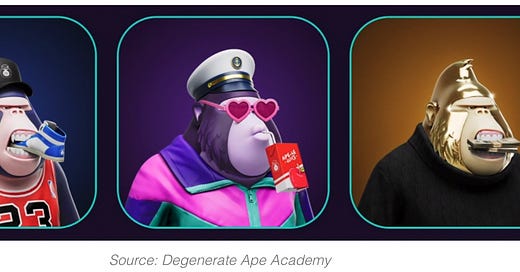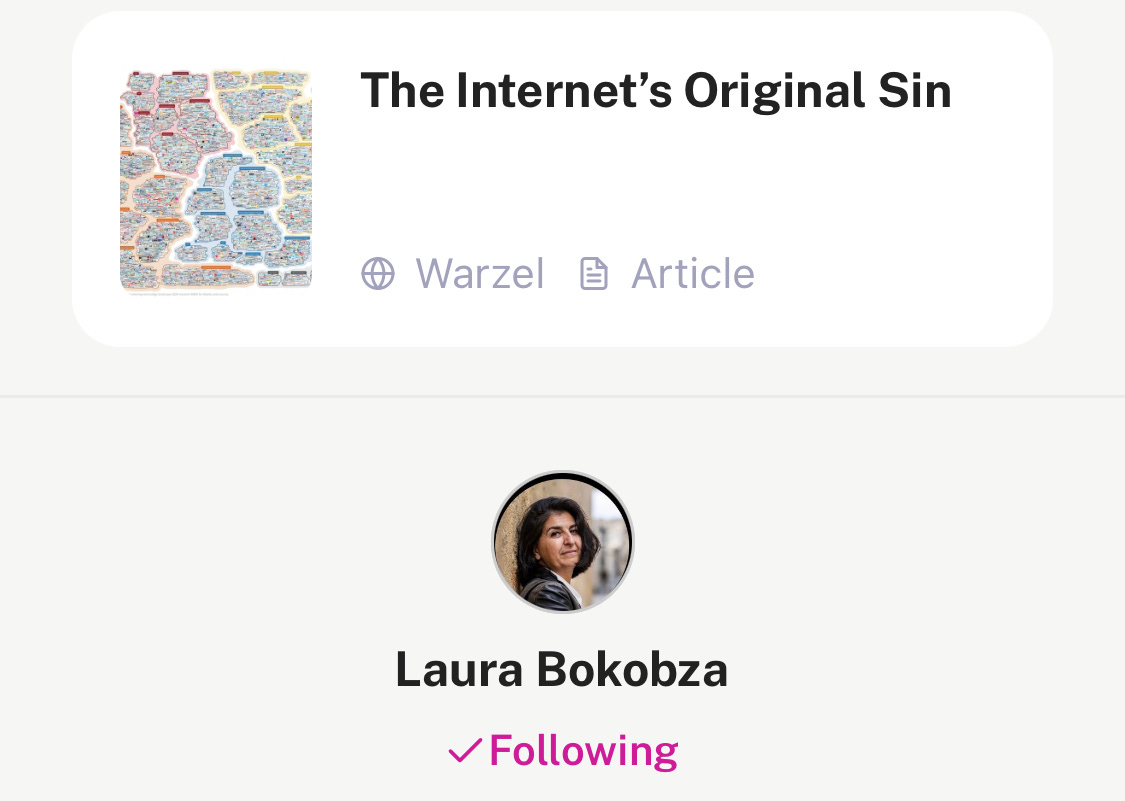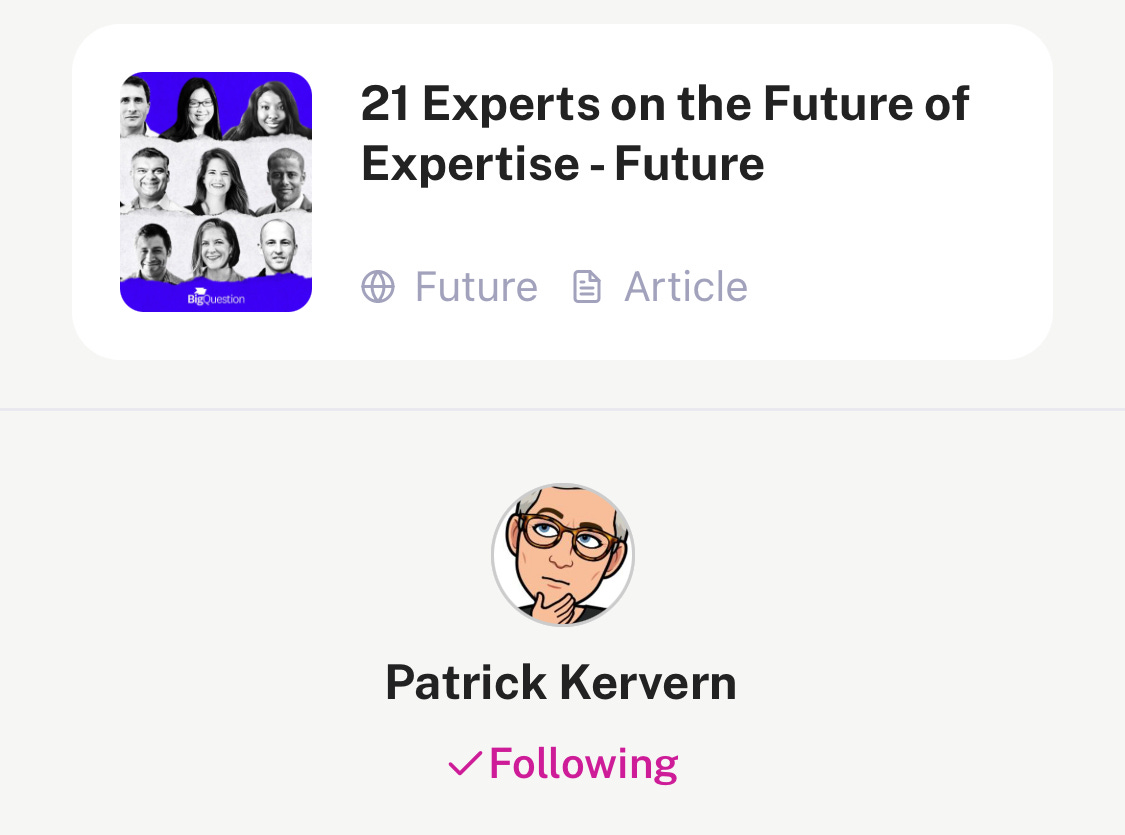Someone is watching you 👀- Who is Joe Rogan ?🎙- Experts about the future of expertise 🎯- Tinder 0 to 1000 users ❤️- Solana Summer ☀️
Top insights from key opinion leaders every week
Episode #30. Hi there! I'm Gilles, the founder of Clind and author of The Timestamp. Our 2500 readers just love saving time so I will go directly to the essentials. You are now +30 new subscribers. Thanks! Congrats to our selected curators of the week!
Discover this week :
Someone is watching you curated by Laura Bokobza,
Who is Joe Rogan written by Eugene S. Robinson,
Experts about the future of expertise curated by Patrick Kervern,
Tinder 0 to 1000 users written by Ali Abouelatta,
Solana Summer was written by Packy McCormick.
Last week edition was a success, I hope you will enjoy reading (and sharing) this one as well!
#1 Someone is watching you
The Internet’s original sin published on September 23rd 2021 in the newsletter Galaxy Brain (source article click here), curated by Laura Bokobza.
☁️ There are over 8000 MarTech companies helping run the AdTech world, and the Ad Exchange, that sucks our personal data for nefarious use.
☁️ For Shoshana Wodinsky, interviewed in this piece by author Charlie Warzel, it's a matter of scale. Companies want to be profitable and don't care about what you think as you are but just one user.
☁️ We live in an economy where every single data point about us is collected by one company and matters to another somewhere. And we might want to be targeted sometimes. But individuals don't have any choice in the matter. Whereas they should. And this choice conversation needs to happen now.
Laura Bokobza is a startup mentor, advisor & board member. You can subscribe to her weekly newsletter called “How and Why”. Laura is also the host of a podcast called “Revues et corrigées” and also has the French version of her newsletter called “Le comment du pourquoi”.
#2 Who is Joe Rogan?
Sorrows of young Joe Rogan published on September 5th 2021 in his newsletter ‘Look what you made me do’ (source article click here) written by Eugene S. Robinson.
☁️ Is Rogan funny? This is the Rogan who turned a show done in his garage into $130 mil. This is Rogan who was getting high with Elon Musk. This is the Rogan who can do, apparently, whatever he wants, which doesn’t seem to include any “wrong”. So yeah, he’s funny.
☁️ He’s supposed to be funny. So a better question is, maybe, how funny was he? And that’s harder to answer because there is, more than anything, a sense that there’s a war at the core of whoever it is that Joe Rogan is now.
⛅️ No one in the creative side of the entertainment business really cares about “most people”. We care about the right people. And while the right people might be digging on fart jokes and horse dewormer, a much more reasonable question now would be, are those really the right people? Does Joe know? Does he care to know? Can he know?
Eugene Robinson is a journalist and you can subscribe to his newsletter called Look What You Made Me Do (on Substack clicking here) . Robinson is as well singer for the rock art brut quartet OXBOW.
#3 The Future of Expertise
21 experts on the future of expertise published on September 8th 2021 in the a16z blog called ‘Future’ (source article click here) curated by Patrick Kervern.
Youyang Gu: Tech lowers the barrier of entry to expertise, but not the bar.
Hollis Robbins: Many education technologies focus on information delivery, not teaching, or focus on networks of people who know people, not subject matter expertise … Too few people inside and outside the education sector talk about what makes a great teacher and what makes great teaching.
Eliot Peper: if you can’t explain an idea with simple, clear, precise language, you probably don’t yet have an idea worth explaining.
Fadeke Adegbuyi: The command and deep understanding of a subject has been decoupled from credentialism. Experts can be born and brought up on the internet, bypassing post-secondary institutions and other centralized forms of education.
Andy Broomberg (Co-founder at CoinList): The ivory tower is giving way to the village. If the wisdom of crowds is a form of ‘averaging out’ each person’s abilities, then the wisdom of communities is a way to compound them
Matt Clifford (Co-founder and CEO Entrepreneur First): “how do we build better tools and institutions for distinguishing “contrarian and correct” from “crank”? The two will often look similar, but the former might sometimes (literally) save the world. ?”
David Lang: “Science is stuck in its Napster moment — just as the music industry fought the coming disruption of technology, the science establishment is one of the last institutional holdouts to the reality of a digital, connected world...Science is being played as a finite game when it could, and should, be infinite.
Patrick Wyman: “We’re not dealing with a crisis of expertise itself as much as a crisis of explanation...It’s incumbent on these fields to develop not just their specific expertise, but also the ability to communicate that expertise in terms the general public can grasp. Amid a crisis of public trust in experts, the only path forward is to make massive investments to renew that trust through an open and effective explanation of why experts are “right.”
Packy McCormick (Author of Not Boring): “Expertise is yours if you can prove it...Unquestioned experts didn’t really have to tell a compelling story. They were the experts, and their word was law. Now that everyone has a voice, weaving together facts, figures, and information into a clear, coherent, and compelling narrative is the only repeatable way to stand out.”
Andy Coravos: Cultivate a beginner’s mind. We should instead entertain two contradictory ideas simultaneously: that both existing expertise and an openness to new methods with unexpected outcomes can, and should, coexist on a truth-seeking journey.
Hamish McKenzie (Co-founder of Substack): Lots of people claim to be experts because they’re richly rewarded by a spectacle-oriented information ecosystem that runs on attention. On social media, posers are often given the most status points, and so we’re left with a misleading idea of authority; it seems the people who are loudest in their claims to be experts — the ones we hear from most on Twitter, Facebook, and YouTube — are the ones to be most wary of...Many of us are living in an alternate reality.
Lindsay Howard: Expertise will come from collectives. (With the introduction of NFTs, we’re already seeing seismic shifts in what constitutes art and who can participate in the art market). Artists, for instance, have already been putting the internet to good use for decades by making it a space for decentralized expertise and resource sharing, whether through renegade collectives (Free Art and Technology Lab) or open-source toolkits for creative work (openFrameworks) or other initiatives. With the introduction of NFTs, we’re already seeing seismic shifts in what constitutes art and who can participate in the art market. Now, visual artists, meme creators, musicians, and many others have the ability to generate their own markets through decentralized technologies. Shared expertise is capable of catalyzing cultural movements, resulting in greater opportunities for all. We have a chance to create a different kind of container for what “expertise” is intended to do altogether, by promoting expertise without necessarily centering the expert. Imagine the creative potential of operating according to this principle: a collective redefinition of expertise that could also represent a collective redefinition of value.
Patrick Kervern, Founder at UMANZ. Sense-Maker & Curiosity expert. You can also subscribe to his newsletter 🇫🇷 on Substack here.
#4 Tinder from 0 to 1000
Tinder published on November 2nd 2020 in his newsletter called First1000 (source article click here) written by Ali Abouelatta.
☁️ Tinder hit 15k users within a week from launching! Back in 2012 having FB as your only signup option was one of the main reasons for Tinder’s steadfast growth trajectory.
☁️ Tinder as the guestlist for sister sorority parties and sponsored parties in collaboration with the coolest frat on campus
☁️ Targeting key influencers helped them grow quickly and allowed them to create self-sustaining networks before it gradually was introduced naturally to other demographics.
☁️ Tinder did not take out ads on Facebook and they did not use the mass email lists of college students that people offered them. They understood that there is a huge difference between someone who downloads the app because they found it on an ad and then never uses it again, versus someone who downloaded the app because their friend had a great experience on it and told them about it.
⛅️ Focusing on organic growth also helped them stay focused on their core users and refine their product so that it was one people would like enough to share with their friends.
Ali Abouelatta is a product manager at Juno and the author of the newsletter First1000. He publishes every week how some great companies signed their first 1000 customers. First1000 helps founders get their first 1000 customers.
#5 Solana Summer
Solana Summer published on August 23rd 2021 in his newsletter called Not Boring (source article click here) written by Packy McCormick.
☁️ Solana is a Layer 1 protocol, or blockchains, like Bitcoin, Ethereum, or a number of others.
☁️ Whereas Bitcoin can handle about 7 transactions per second (TPS), and Ethereum can handle 30 TPS (until Eth 2.0 dramatically increases it), Solana can currently handle 65,000 TPS.
☁️ Whereas it costs ~$3 today to do a transaction on the Bitcoin blockchain, and ~$8-40 on Ethereum, it costs $0.0001 to do a transaction on Solana.
☁️ Solana uses a Proof of Stake consensus mechanism plus Proof of History. what it means is that transactions on Solana are verifiably ordered without all nodes needing to agree simultaneously.
☁️ It also means that Solana can be single-shard. While Eth2 is expected to reach 100k TPS, it, and other new blockchains will do so by sharding, creating sidechains that tie back into the main Ethereum blockchain. Solana does everything on one single chain, in a single state.
☁️ CEO of Solana, Anatoly is a hardcore engineer by background, having spent 13 years at Qualcomm.
☁️ Just five months into his time at Dropbox, Anatoly left to build his blockchain project. By November 2017, he’d written and published the Solana Whitepaper, “Solana: A new architecture for a high-performance blockchain.”
☁️ That started with the team. Raj Gokal, Solana Labs’ COO, joined in December 2017 from the health tech world. In early 2018, Anatoly brought on two former Qualcomm colleagues, Greg Fitzgerald and Stephen Akridge, to start turning the paper into a product. Anatoly had started in the C programming language, but Greg convinced him to move it over to Rust. They named the company Solana after Solana Beach, where Anatoly, Greg, and Stephen surfed together when they worked for Qualcomm in San Diego.
⛅️ Solana is a centralized exchange like NASDAQ is a single node.
Packy McCorming is the author of Not Boring, a newsletter you can find on Substack and on Clind that talks about cool companies and investing in a new way. Not Boring has more than 72k subscribers.
With The Timestamp, and with the Clind app, we help curators build their audience with short summaries they write about articles, podcasts, newsletters you may have missed over the past few days. As a reader of this newsletter, you may want to connect and follow our curators and writers on the Clind app, pls download it on the App Store or Play Store.
And if we are lucky enough to have you read this newsletter so far, that certainly means you enjoyed The Timestamp, so pls spread the word and share it.
See you next Sunday!








